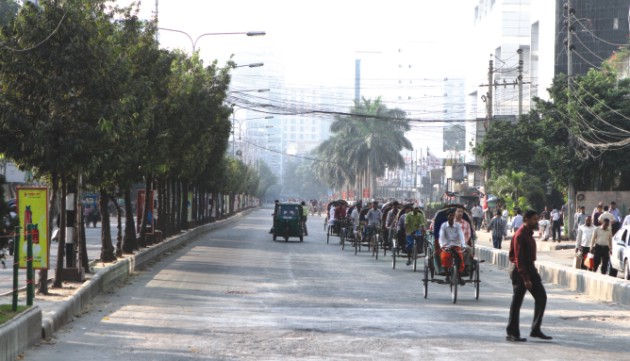|
Postscript
CITY OF CONTRASTS
AASHA MEHREEN AMIN

Photo: Zahedul I Khan
Like many South Asian cities where land area is totally disproportionate to the number of city dwellers, Dhaka too is a city of contradictions.
You have horrendous traffic jams throughout the year so that going from Karwan Bazar to Farmgate may actually take an hour or so. Then, during Eid holidays, the streets are so empty that you can actually experience the novelty of coming from Uttara to Dhanmondi in about 20 minutes. You have five-star hotels that serve Evian for probably 300 taka or so opposite ramshackle streets where beggars and their children harass bewildered foreigners who think it might be interesting to take a walk.
This is a city where many of its denizens live under the opens sky, in shacks next to the railtracks or even abandoned train compartments while others get bored watching cable TV on huge LCDs in their swanky apartments where even the door knobs are from Italy. The roads are usually potholed, unwalkable with sand hills, rods and brick piles –construction never ends you see- but it will be surprising if you don't find a cyber café every twenty steps or so. You maybe in a grimy, dusty rut of a place, but you can be connected anytime with anywhere. Everyone, even the construction worker, has a cell phone.
In the middle of all the chaos you may come across nice-looking teenagers in yellow T shirts selling roses to passengers and drivers to raise money for a day of fun for street children. It heartens one's heart in this cynical place that privileged kids are becoming conscious about their responsibility as citizens of a poor country where nobody seems to really give a damn.
Then when you are almost sure about the possibilities that only the young generation can bring, you come across a handful of rich young brats squabbling in the middle of the road of some posh area, their flashy sports cars parked and dented from a callous brush with a poor rickshaw puller's rickshaw. Their main occupation is to occupy themselves spending their parents money – by acquiring fancy cars to race –so what if the odd poor pedestrian or rickshaw puller gets hit-and eat at super expensive restaurants or worse, abuse drugs, alcohol, whatever they can lay their hands on to kill time with. It's their parents fault you may self-righteously think to yourself or the government's for the dearth of honest law enforcers who will not turn a blind eye because of wads of cash these kids bring from their parents' pockets.
Eid is over and the migratory humans are back. The city is supposed to be jampacked again. But just when you are planning your long route to the office or home – how you will endure the long hours - reading, snoozing, eating lunch, praying or cursing- a hartal is announced and the scene changes completely. All of a sudden, in the middle of a busy avenue, a bus is bursting into orange flames. Hartal supporters and 'activists' are always ready to make a bonfire out of vehicles. We watch almost dispassionately as the bus makes explosive sounds when the flames reach the gas cylinder, people and vehicles are turned away by the police although television channel vans are allowed to report this latest bit of excitement and photographers use their flash incessantly. The Fire Brigade of course, is the last to come. For a few exciting minutes we think how we will get home before the night is over. The streets will be almost empty tomorrow.
The next day it may be again totally different. The hartal fervour will have died down. The shattered glass will have already been picked up by some poor man who collects the glass barefoot, putting the pieces into a sack in the hope of selling it later for a few takas. Everything in the city has value. Even shattered glass from a burnt bus.
Children will grumble as they reluctantly go back to school in the morning and we grown ups will continue our mundane lives waiting for the next anomaly to happen.
Copyright
(R) thedailystar.net 2010
|

